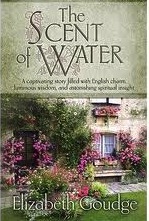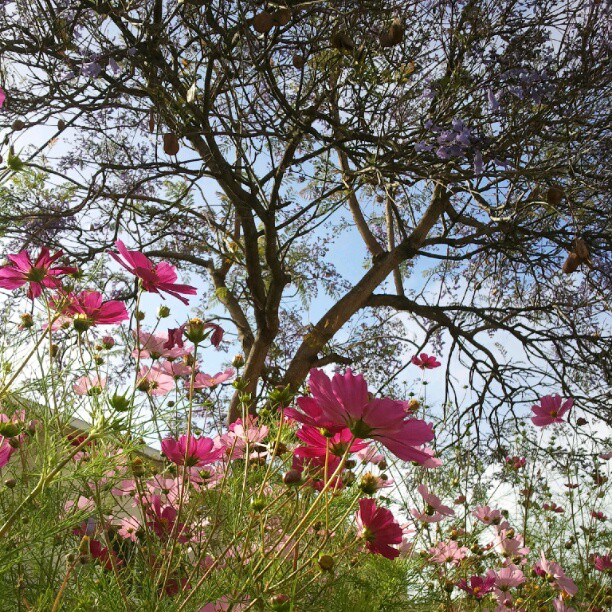June 18, 2012 @ 8:15 pm | Filed under:
Books  This one’s going to take me a little while to find words for. I don’t know how to write about it, and I don’t know how not to. I was fifty or sixty pages in when I turned to Scott and said—I felt breathless—I think I found my favorite book. I knew I would probably enjoy it; I love Elizabeth Goudge’s writing; I’ve loved Linnets and Valerians more each time I’ve read it. But The Scent of Water went even deeper, burrowed right into the center of me. I kept thinking, I didn’t know, I didn’t know.
This one’s going to take me a little while to find words for. I don’t know how to write about it, and I don’t know how not to. I was fifty or sixty pages in when I turned to Scott and said—I felt breathless—I think I found my favorite book. I knew I would probably enjoy it; I love Elizabeth Goudge’s writing; I’ve loved Linnets and Valerians more each time I’ve read it. But The Scent of Water went even deeper, burrowed right into the center of me. I kept thinking, I didn’t know, I didn’t know.
For now, while I’m sorting out why, I’ll let Elizabeth do the talking. Never in my life have I marked so many passages in a single novel.
“…a silver tankard of lilies-of-the-valley stood on an oak chest. The flowers and the polished silver gathered all the light to themselves…”
That one comes early, and I marked it not knowing how important the objects, and the gathering of the light, were going to be—in that first encounter, it was the sheer beauty of the image that made me gasp. I started the book a few weeks ago and then set it aside, and all through those days this line kept repeating itself in my mind. The flowers gathered all the light to themselves. What a poet she is.
The piercing clear deep ringing and ringing seemed thrusting through her almost intolerably. She believed she had not heard such birdsong since she was a child; yet every year they had been singing like this in the tall woods of England…
The poets did at least put it into words for you and ease the pain of it.
I have at least thirty more quotes marked but the evening has run away with me—as usual! I can’t possibly type them all out, anyway. I need to read it again. Soon. The night I finished it, I dove right into Linnets and Valerians to ease the pain of parting, and now I’m onto The Bird in the Tree. I have nearly her whole body of work ahead of me. Such riches!
June 14, 2012 @ 8:26 pm | Filed under:
Books 
“A garden had to be your own before it would let you in, and even your own garden did not give up its secrets unless it liked you. But if a garden had once been your own, did it disown you when somebody else took possession of it? She did not think so.”
—The Scent of Water, Elizabeth Goudge, p. 30.
May 29, 2012 @ 6:04 pm | Filed under:
Books 
At a certain stage of writing, I have great difficulty reading other fiction. But this is akin to saying “I have great difficulty breathing oxygen.” And when, as now, the intense writing stage stretches out somewhat longer than expected, I begin to get…squirrely. I’m crafting my own story while holding my breath. I crave a nice deep inhalation of fiction. Ha—I didn’t even realize I was spinning an inspiration metaphor until now. Inspire: “to stimulate to action,” “to fill with enlivening or exalting emotion,” “to breathe life into,” “to draw in air.”
There are a few, a very few, works of fiction that can mist past the boundaries my working mind puts up against other people’s stories when I’m deep inside my own. The Blue Castle. Rilla of Ingleside. Sometimes, but not always, Anne’s House of Dreams or Anne of the Island. (You may detect a pattern.) Betsy’s Wedding and the four high-school Betsy books, but not Betsy and the Great World—all the travel, I suppose, too many absorbing new places to take in. I can’t accommodate so many setting changes when I’m rooted to my own fictional world. Curiously, Middlemarch works, and the first third of Portrait of a Lady (but as soon as Isabel meets that snake Osmond, I must bail). Never Austen. Austen is a reward for finishing a novel. Sometimes L’Engle, but I have to be careful with her: her characters have an archness about them, a precociousness that works beautifully in her prose but I can’t risk it seeping into my own, where it would surely be too much sugar in the peas.
(I think House Like a Lotus was the book that made me realize that L’Engle’s characters, much as I adore them, are not exactly real people. At least—Meg was real, with her prickles and that ribbon of cynicism in her soul. And Vicky Austin, so sensitive you’re almost afraid to look at her askance. (Oh how I love Vicky.) But Polly, oh my. You know that scene at the beginning of the international conference when the well-traveled workers gather and sing, spontaneously going around the circle, each crooning Silent Night in his or her own language? And Polly, not missing a beat, jumps in—in German? Yeah, that’s when I realized that much as I enjoy Polly and am rooting for her, I don’t find her relatable. Which is fine. Isabel Archer isn’t terribly relatable either, but she (like Polly) is interesting, and that’s plenty. But I digress.)
One book that works like a charm for me these days is Alan Bennett’s gem, The Uncommon Reader. In my desperate state of fiction-deprivation, I turned to it again two nights ago, and it was like coming up from underwater and drawing a deep breath of air. This is a book I’ve highlighted practically from cover to cover—so many quotable quotes. (Those are but a few. The title of this post is another.)
As the Queen of England (that most unlikely of relatable characters) finds her way into fiction (well, and nonfiction, too; for her the discovery is the absorbing, altering joy of reading itself—whereas my current troubles are only with fiction; I inhale reams of nonfiction with no difficulty), so, too, am I drawn back into the romance of The Other Person’s Story. And so it was that when I finished Uncommon Reader last night, I was immediately, almost in the next breath, able to fall headlong Elizabeth Goudge’s The Scent of Water—a book I started ages and ages ago, and set aside, always meaning to return. For me, Goudge is as Alice Munro is for the Queen:
‘Can there be any greater pleasure,’ she confided in her neighbor, the Canadian minister for overseas trade, ‘than to come across an author one enjoys and then to find they have written not just one book or two, but at least a dozen.’
Linnets and Valerians is practically woven into my DNA—the song to the bees rings in my ears every time I walk out to my garden—but the only other Goudge I’ve read, despite having collected and hoarded nearly a dozen of her novels over the years, is The Little White Horse. It was Lesley Austin, over at Wisteria and Sunshine, who brought Elizabeth Goudge back into my mind. This afternoon, when the orthodontist’s waiting room faded away and the little English village of Appleshaw formed around me, and the house with the green door, and Queen Mab’s hazelnut-sized coach in the collection of ‘little things,’ I knew I’d remembered how to breathe again.
 This one’s going to take me a little while to find words for. I don’t know how to write about it, and I don’t know how not to. I was fifty or sixty pages in when I turned to Scott and said—I felt breathless—I think I found my favorite book. I knew I would probably enjoy it; I love Elizabeth Goudge’s writing; I’ve loved Linnets and Valerians more each time I’ve read it. But The Scent of Water went even deeper, burrowed right into the center of me. I kept thinking, I didn’t know, I didn’t know.
This one’s going to take me a little while to find words for. I don’t know how to write about it, and I don’t know how not to. I was fifty or sixty pages in when I turned to Scott and said—I felt breathless—I think I found my favorite book. I knew I would probably enjoy it; I love Elizabeth Goudge’s writing; I’ve loved Linnets and Valerians more each time I’ve read it. But The Scent of Water went even deeper, burrowed right into the center of me. I kept thinking, I didn’t know, I didn’t know.

